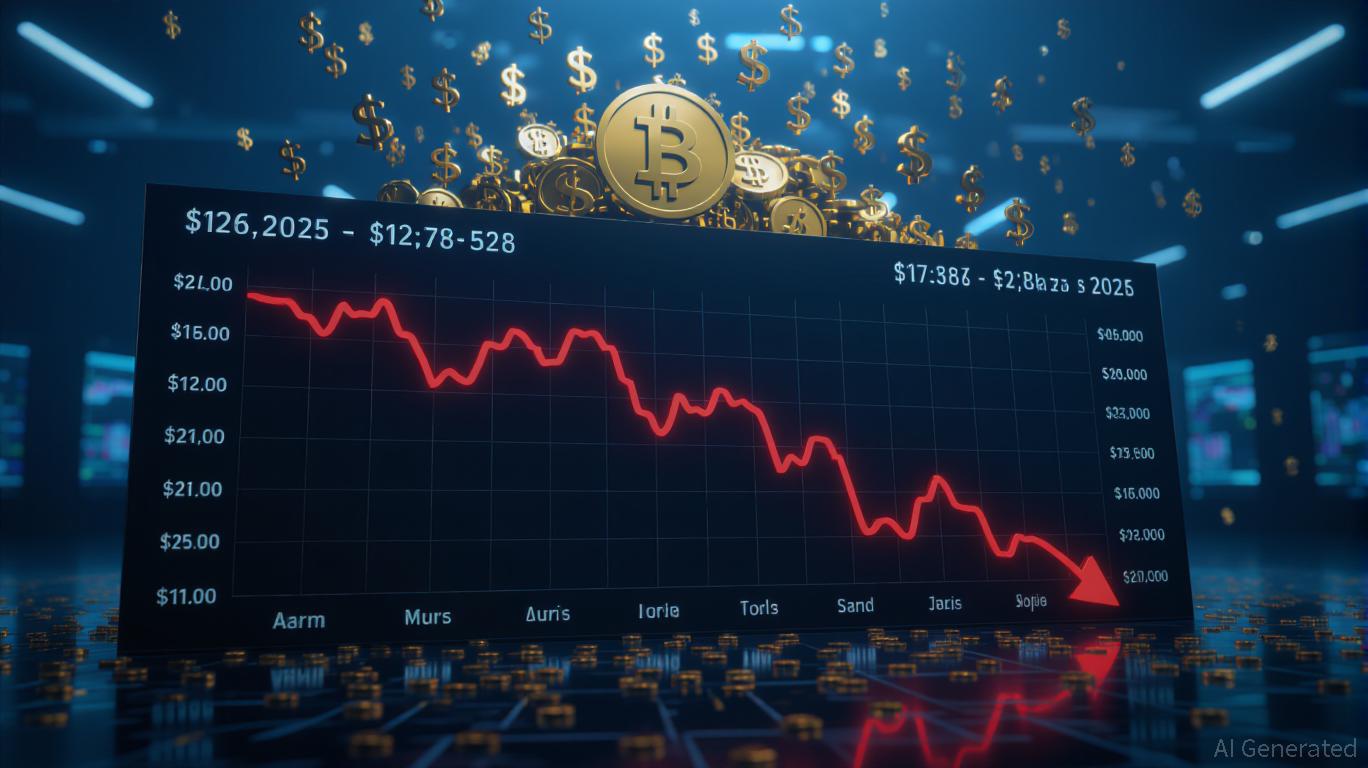What Led to the Latest BTC Plunge and Its Implications for Cryptocurrency Investors?
- Bitcoin's 2025 crash erased $1T in value, exposing systemic risks from macroeconomic shocks and regulatory gaps. - Trump's tariff rhetoric triggered $20B in crypto liquidations, while SEC's Fuse Energy decision highlighted fragmented oversight. - Retail panic contrasted with institutional resilience, as IBIT and gold ETFs saw $5.8B inflows amid market instability. - Experts debate Bitcoin's fundamentals, with some forecasting $100k-$135k ranges and others warning of prolonged volatility.
Systemic Risk Triggers: Regulatory Uncertainty and Macro Shocks
This market crash was the result of several converging factors, with the most significant being the abrupt intensification of tariff threats from the Trump administration in mid-October 2025. This development sparked a worldwide shift toward risk aversion, resulting in $20 billion in leveraged positions being liquidated in a single day—the largest such event in the history of cryptocurrencies

Regulatory measures—or the absence of them—were also a contributing factor. Although the U.S. Securities and Exchange Commission (SEC)
Market Psychology: Panic, Hedging, and Institutional Resilience
This downturn has exposed the delicate mindset of crypto traders. Many retail investors, who had taken on leveraged positions, suffered widespread liquidations as Ethereum alone
Despite the turmoil, institutional investors have demonstrated stability. The iShares Bitcoin Trust (IBIT) saw $3.3 billion in new investments in June 2025, while gold funds such as SPDR Gold Shares (GLD) attracted $2.5 billion, indicating a move toward safer assets
Regulatory Responses and Financial Stability
Regulatory intervention has been limited in the wake of the crisis. The SEC’s recent ruling on Fuse Energy marks progress toward clearer guidelines but does little to address the broader systemic risks
There is no consensus among analysts about what comes next. Optimists such as Standard Chartered and Bitwise
What This Means for Investors
This sharp downturn serves as a crucial lesson for crypto investors. The combination of unclear regulations, global economic shocks, and leveraged trading has created a highly unpredictable environment where even experienced participants can incur significant losses. Effective diversification and risk management have become essential. While institutional players continue to add to their BTC holdings, individual investors should proceed with caution, avoid excessive leverage, and pay close attention to regulatory developments.
The SEC’s gradual moves toward clearer rules, such as its decision on Fuse Energy, provide some optimism for a more orderly market. However, until major risks like cross-market contagion and fragmented regulation are resolved, cryptocurrencies will continue to be a high-risk, high-reward investment. The current market is testing the endurance of its participants, and the experiences of late 2025 will influence the next phase of the crypto industry’s growth.
Disclaimer: The content of this article solely reflects the author's opinion and does not represent the platform in any capacity. This article is not intended to serve as a reference for making investment decisions.
You may also like
CryptoAppsy: Experience Instant Access—No Registration Needed, Perfect for Fast-Moving Markets
- CryptoAppsy offers real-time crypto price tracking and alerts via iOS/Android, requiring no account creation, targeting global users in Turkish, English, and Spanish. - Market volatility drives demand for instant data, contrasting with subscription-based models, as seen in GoPlus's 717M monthly API calls and WEEX's 100% APR promotions. - Competitors like BI DeFi emphasize security upgrades post-$15B breach, highlighting crypto's growing focus on risk mitigation alongside innovation. - CryptoAppsy's succe

Ethereum Latest Updates: Buterin's Railgun Transaction Ignites Privacy and Pre-Sale Discussion as ETH Reaches $3,000
- Vitalik Buterin transferred $2.9M ETH to privacy protocol Railgun as Ethereum surged past $3,000, triggering speculation about liquidity events. - On-chain analysts highlight Railgun deposits' historical link to pre-sale activity, though Buterin's 0.4% stake transfer doesn't inherently signal selling. - Buterin's $738.6M ETH holdings and recent privacy advocacy, including his "privacy is hygiene" stance, frame the transaction's strategic context. - Market reactions remain divided between regulatory hedgi

Thailand Closes Worldcoin Due to Unlawful Exchange of Biometric Data for Cryptocurrency
- Thailand ordered Worldcoin to halt operations and delete biometric data from 1.2 million users, citing PDPA violations involving iris scans for crypto tokens. - Authorities raided a Bangkok scanning center in October 2025, arresting employees for operating an unlicensed exchange and highlighting data leakage risks. - Worldcoin paused services in Thailand, denying wrongdoing, while the WLD token dropped to $0.6172 amid global regulatory crackdowns in Colombia, Spain, Brazil, and Kenya. - Regulators worldw
ALT5 Sigma’s Strategic Shift in Crypto: Regulatory Changes, Firm Belief, and Declining Investor Trust
- ALT5 Sigma's shift to a digital asset treasury model triggered an 80% stock plunge amid regulatory scrutiny and leadership turmoil. - U.S. regulators probed abnormal trading patterns while the CEO's suspension and Rwanda's money laundering conviction remained undisclosed. - Shareholders accuse the Trump-backed WLFI partnership of a "money grab," as the token dropped 34% post-listing. - The controversial DAT strategy faces skepticism for enabling large token holders to manipulate markets without direct pr
